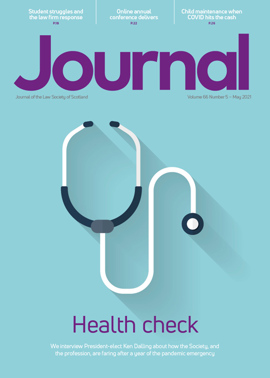High tech, high powered

Technically excellent, and packed with quality content.
Having watched the Society's 2021 annual conference take shape over recent months, and the gaps in the programme slowly fill, the way it finally unfolded must have come as a huge relief to the organising CPD team. Any selection of highlights can barely do it justice, but it is worth picking some out.
Equality first
Equality issues featured strongly on the first and last days of the conference.
President Amanda Millar opened proceedings with a typically forthright address in support of diversity and inclusion – rebutting those who had told her she ought to be focusing on other concerns at the present time. You must be true to yourself, she asserted, and the importance of the Society's equality work had been shown in recent times. She cited the 2019 survey undertaken with SeeMe on attitudes to mental health; its use of social media to feature people with different backgrounds, and a campaign for school pupils with the same aim; its celebration of Pride, Black History Month, and religious festivals; and its new racial inclusion group.
Promoting her #MuchStillToDo message was exhausting, but she was not going to let up. It is only by all working together that we will deliver a profession that includes everybody and represents all those we would serve, she concluded.
Justice across borders
If we were in any doubt about the need for continued action, it would have been dispelled by the Friday morning keynote addresses. First, racial equality and human rights activist Debora Kayembe, something of whose story we related last month, shared some more about her personal journey, from the Congo to England as a refugee and then to Scotland. Although the Society had “opened the door” to allowing her to practise in Scotland, there had been no mentoring or other support available. Asked whether it was right that it should not be too easy to qualify, she replied that assessing you as fit to practise was a different thing from personal or financial support: “It is very expensive to qualify, and takes time.” She contrasted the more inclusive process to be admitted in the USA.
The need to combat racism was a recurring theme in her remarks. It is the first thing she would wish to achieve as rector of Edinburgh University; she named it along with climate change when asked what inspires current students; and it featured when she was asked which particular aspects of human rights were in danger of being eroded. Freedom of speech, she answered – because racists are using it to diminish others. Everyone is claiming the right to free speech for their own advantage, rather than in the interests of society, or peace and justice. The right to protest was also at risk.
Kayembe was followed by a powerful address from Baroness Scotland, English QC and Secretary General of the Commonwealth. Taking the theme of our interdependent and interconnected world, she highlighted how the Commonwealth had developed as an equal partnership of nations “out of a spirit and thirst for equality and justice”. This emphasis on equality had been promoted by the Queen and the late Duke of Edinburgh ever since the 1950s, a time when “very few were talking about the equality of races”.
Describing its operation today as a “network of networks”, Scotland described the cooperation that had taken place during the pandemic – including justice systems, which had shown “remarkable resilience in maintaining levels of functioning”. Technology had brought profound changes; some might have difficulty with these, especially if representing themselves, but it had the potential to improve quality and efficiency, increase transparency, and reduce opportunities for corruption.
The Commonwealth secretariat “takes the view that an ethical and inclusive approach to the technology is key”, she continued. “It must be inclusive rather than exacerbate inequalities, ensure access to justice for all, and secure lasting and positive change.”
She concluded: “There is so much we can do as lawyers to lay the foundations to build back better.” If lawyers equip themselves to use the digital tools, “This is our moment to conceive a more just world and breathe life into it.”
Judges as lawmakers
Further topical content was delivered later that day by Lord Hodge, Deputy President of the UK Supreme Court, who chose to “revisit the scope for judicial lawmaking”, in particular through judicial review.
It is an important feature of our constitution: the separation of powers calls for “clear eyed regulation of the role of each branch”, and the principle that the executive should be subject to the rule of law is of ancient origin, in Scotland as in England.
Reviewing the development of the case law, Hodge emphasised the necessary limitations on the judicial role: avoiding judgments on the merits of policy decisions; and developing the law incrementally, not by radical departures.
Yes, tensions can arise from time to time between the courts and Government or Parliament, but they are not a constant, and are “unavoidable in a healthy democracy”. The idea of a breakdown between the two is grossly exaggerated. Any concerns over the exercise of judicial powers should be tempered by recognition of this reality, and Parliament “will want to approach with great caution” any enhanced ouster provisions (something currently being put forward by Government).
Word of the day, and perhaps the week, had to be “smeddum” (a good Scots word for spirit, or mettle) – Hodge's answer to the question, what one quality above all does a Supreme Court judge require?
Brexit: the aftermath
If Dominic Grieve is to be believed, the Government will pull back from changing the law on judicial review. The former Attorney General was in fine form in his address on the Wednesday, with a revealing account of the politics at the heart of the Brexit process through to 2019, including his eventual rebellion against his party, which began with his unease over the Henry VIII clauses in the Withdrawal Act.
Without becoming too political, it is worth noting his observations that the UK has always operated on the basis of consensus, and there are bound to be “damaging repercussions” if you do something like Brexit against majority opinion in (in this instance) Scotland and Northern Ireland; that once you initiate a revolution, it can go off in a direction that people don't expect; that the Trade and Cooperation Agreement must only be the start of a discussion about what the future relationship with the EU will be; and that sovereignty is “an old myth with new myths piled on top”: the UK has signed up to about 800 treaties with binding arbitration provisions.
In the panel session that followed, Christine O'Neill QC of Brodies observed that we are “certainly not in a place where the law is more straightforward than before”, and that commercial reality is that clients are making their own risk assessments where what is now required in order to trade is unclear.
It was at this point that Grieve offered the views, first, that the European Convention on Human Rights is safe in the UK: leaving it would create “another layer of divorce from the EU”; and also that the Government will not succeed in changing the law on judicial review. He then floated the thought that if European jurisdictions succeed in picking up dispute resolution work that used to come to the UK, English law could become “internationalised but no longer practised” – like the Code of Justinian, it would be taken into other systems and then modified at will. It has, he added, already happened in New York.
From the panels
Despite the spreading of the programme over a week, there were still clashes of breakout sessions and it is impossible to cover all the excellent presentations in a single article.
Technology featured strongly. Criminal practitioners Krista Johnston and Stuart Munro discussed the pros and cons of remote hearings, largely agreeing that we need to find the right place to draw the line (and it would be worth researching jurors’ experience, Munro suggested). Johnston added that virtual prison visits had been a “revelation”, though not suitable in every situation, and both agreed that electronic bundles of documentary evidence ought to replace paper entirely.
On the conveyancing front, a panel including Keeper Jennifer Henderson agreed that the hastily introduced digital applications to Registers of Scotland were an advance that is here to stay; indeed testing (with solicitors, of course) is now taking place on the next level, creating deeds within the system, which could eliminate the need for checking by Registers. Ann Stewart raised the question whether the conveyancing monopoly still has value, suggesting that it lay in title examination and client support: “We should be freed up to concentrate on the things that only a human can do.”
There was business support as well. Consultant Scott Foster explored the parallels with the credit crunch recession – firms carry much less debt now, partly through more efficient fee collection. He also explained how to make a persuasive funding application to your bank. Short version: show you know your business and understand the management information, and be ready for questions.
That followed a panel session on the economy, in which the CBI's Tracy Black flagged up the current opportunities for Scotland in tackling the climate change challenge – but we need to get business, Government and regulators working together, “harness the money”, and get rid of red tape – it takes too long to get projects off the ground. Our “world-class” university sector, allied with post-pandemic healthcare, is another area to target.
Final impressions
How to sum up the week? It inevitably lacked the networking side and the exhibitor displays, but contained far more than the traditional full day could have, and attendees were able to choose their days (is it possible for the future to offer further flexibility in selecting sessions?). There appeared to be few technical hitches, and sessions notably ran to time. Most speakers, and questioners, even remembered to unmute!
Closing the conference, Lorna Jack said she was “incredibly proud” of the Society for hosting it, after the months of planning, and managing the technology. It had felt like a collaborative event: “Zoom meetings have become almost second nature, but it’s been great to see so many people participating.”






